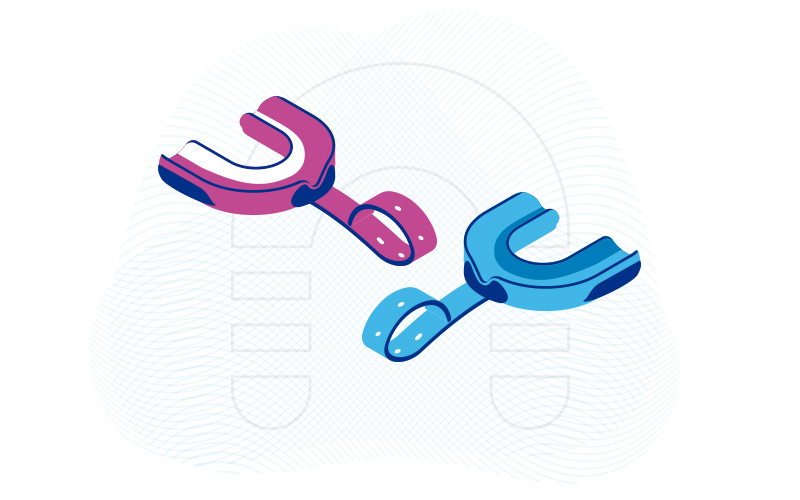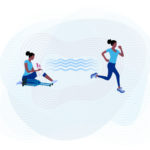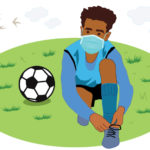Save that shot and your child’s teeth: The benefits of mouthguards

Competitive sports can get intense. They can also get physical, with athletes inadvertently colliding and balls moving fast at all kinds of angles.
We spoke with Zameera Fida, DMD, an associate in the Department of Dentistry at Boston Children’s Hospital, about the importance of mouthguards and what you should do when not only your child resists but also the sports leagues that determine safety protocols.
If your child doesn’t wear a mouthguard, consider having a pep talk with them this sports season about the importance of protecting their teeth, tongue, jaw, and face. Injuries can happen not just in high-contact sports but also non-contact activities such as biking and skating.
Why should my child wear a mouthguard?
“A mouthguard will protect not only your teeth, but also your gums, tongue, cheeks, and lips from trauma,” Dr. Fida says. “It acts as a cushion to absorb the blow. Whether it’s a blow to the face, knee, or any other part of the body, the gear your child is wearing will absorb the impact.”
What else can my child wear for protection?
Basically, any kind of protective gear will lessen impact and prevent or reduce the severity of an injury. Depending on the nature of the sport or activity, or if your child is uncomfortable wearing a mouthguard in the first place, a face shield is a viable alternative. It can protect the mouth and head. Similarly, the cushion that a helmet provides during a fall will also protect teeth.
What kind of injuries can happen without protection?
Without a mouthguard or other protective gear, much can go wrong. Your child could lose a tooth, but even a minor injury to the mouth could be enough to crack a tooth and require a root canal, according to Dr. Fida. Nerve damage, infection, and tooth discoloration are other possible complications that might not be immediately noticed.
Which sports call for mouth protection?
Almost any physical activity in which the mouth is exposed to injury: high-contact sports such as basketball, hockey, football, soccer, boxing, and wrestling, but also mid- to low-contact sports such as baseball, softball, gymnastics, cycling, rock climbing, weightlifting, and, yes, putting around on a scooter in a driveway. Contact with an opponent’s fist, elbow, or feet, as well as a puck, ball, floor mat, pavement, and any other kind of object can damage the teeth and mouth.
What if my child’s sports league doesn’t require mouthguards?
Many school- and community-run sports leagues require mouthguards, but many do not. It’s an uneven playing field that young athletes and parents must navigate. Aside from urging children to wear a mouthguard, Dr. Fida recommends that parents work together to petition sports officials to mandate protective gear. If the league doesn’t agree, she says parents should still form a peer group that ensures their own children wear them so that other children will be motivated to join the movement.
“Some parents and coaches may fear that a mandate would cause kids to share mouthguards and increase unhygienic practices,” she says. “The kids might be concerned that they wouldn’t be able to communicate as well on the field or court. I hear those concerns but also want to be able to protect kids.”
How can you make mouthguards cool and comfortable for your kids?
Even though famous athletes such as NBA star Steph Curry wear a mouthguard, many other athletes play without one. For instance, while the NCAA requires all its football players to wear a mouthpiece, the NFL has no such requirement. Seeing professional athletes play without oral protection undoubtedly influences children. But Dr. Fida believes mouthguards can still be “cool” and comfortable to wear if you work closely with your child to determine which one fits and looks best.
There are many different varieties, and some can get expensive. They can be bought at sporting goods stores and pharmacies. A dentist can create a fitted mouthguard, working with your child to determine comfort level and gauging what’s needed by the intensity of the sport. “A dentist’s lab can also make them more stylish,” says Dr. Fida of the colors and designs available. A dentist can also stress the importance of prevention and help your child think about the consequences of playing sports without protection.
What should I do if my child’s teeth are injured?
If your child loses an adult tooth during competition or backyard activities, try to place it in the socket as quickly as possible. Hold the tooth by the crown and gently rinse it; try not to touch the root. Gently place it back in the hole, but if you can’t, don’t worry. Place the tooth in milk (not water) and then call your dentist. You can also call Boston Children’s Department of Dentistry at 617-355-6000 and ask to speak with the dentist on call. Eventually, a dentist will numb the area and put back the tooth and can also help restore chipped and cracked teeth.
“We’ll continue to follow-up,” Dr. Fida says. “We’re certainly happy to help with the long-term development of the injured tooth.”
Learn more about the Department of Dentistry or make an appointment.
Related Posts :
-

Teething: Which remedies are safe for babies?
The arrival of your infant’s first tooth is a milestone. But it can also signal the beginning of a ...
-

Many childhood injuries are preventable if you know the risks
As the seasons change, Dr. Lois Lee can predict that certain types of injuries will appear in the Emergency Department ...
-

Not just a physical thing: The psychology of sports injuries and recovery
“Nobody plays sports expecting to get injured, but unfortunately, injuries are part of sports,” says Melissa Christino, MD. As a ...
-

Could returning to sports after COVID-19 harm kids’ mental health?
After a year away from playing, athletes everywhere are excited to jump back into the sports they love. And for ...





